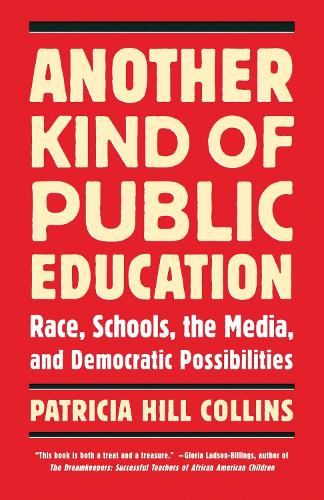
Another Kind of Public Education: Race, Schools, the Media, and Democratic Possibilities
(Paperback)
Publishing Details
Another Kind of Public Education: Race, Schools, the Media, and Democratic Possibilities
By (Author) Patricia Hill Collins
Beacon Press
Beacon Press
1st September 2018
United States
Classifications
Professional and Scholarly
Non Fiction
Philosophy and theory of education
371.82900973
Physical Properties
Paperback
252
Width 140mm, Height 216mm, Spine 14mm
303g
Description
An ambitious book on how schools, race, and the media intertwine in the twenty-first century Sociologist Patricia Hill Collins opens this brilliant new book on race and education by describing how in her senior year at the Philadelphia High School for girls, near the end of a public school education that "had almost silenced me," she was invited to deliver a graduation address on the meaning of the American flag. She refused to deliver the censored version her teacher demanded, and someone else took her place on stage. Another Kind of Public Education spins the threads of that story-the way education, race, and democracy are intertwined; the way racism and resistance work through a variety of unspoken means; what schools do to limit or to open up possibilities-into a call for "another kind of public education," one that helps us "envision new democratic possibilities." Collins begins, in a tour de force of social analysis with practical implications, by demystifying what she calls "racism as a system of power." She argues that the generation coming of age at the turn of the twenty-first century-in a post-civil-rights society that publicly claims to be "color-blind"-needs a new language for analyzing the new "color-blind racism" of contemporary society that has stymied efforts to live up to the promise of American democracy. She shows us how racism as a system of power works in four distinct yet intertwined domains-structural, disciplinary, cultural, and interpersonal. Drawing examples from schools, politics, pop culture, personal experience, and more, she demonstrates in eye-opening ways how racial inequality is manufactured and reinforced, even as we publicly espouse an ideology of color-blind fairness. And she points, crucially, to what we can do about it. Noting that everyone is situated differently in the complex domains of power, she urges us to "think expansively about resistance," to figure out in which domain we can have the most effect in resisting racism as a system of power, and how. She also discusses classrooms around the country, teaching as a subversive activity, "cultivating countersurveillance," and the power of storytelling and media. Blending entertaining storytelling, social theory, and practical suggestions for changing institutions, including schools, Another Kind of Public Education is both a call for change and a reminder that public education-in every sense-is at the heart of American democratic possibilities.
Reviews
In Another Kind of Public Education, Patricia Hill Collins skillfully melds high theory with everyday practice. . . . This book is both a treat and a treasure.Gloria Ladson-Billings, author of The Dreamkeepers: Successful Teachers of African American Children
"Collins argues that four dimensions of racial discrimination continue to characterize American society: structural, cultural, disciplinary and interpersonal, contending that symbolic victories such as the election of Obama and the success of black women like Oprah Winfrey and Condoleezza Rice are no substitute for substantive change. . . . The author's personal experiences as a black woman and as a teacher enliven the book. . . . An intellectually challenging monograph on race relations."Publishers Weekly
Author Bio
Patricia Hill Collins is Distinguished Professor of Sociology, University of Maryland-College Park, past president of the American Sociological Association, and the author of several books, including Black Feminist Thought and Black Sexual Politics.
